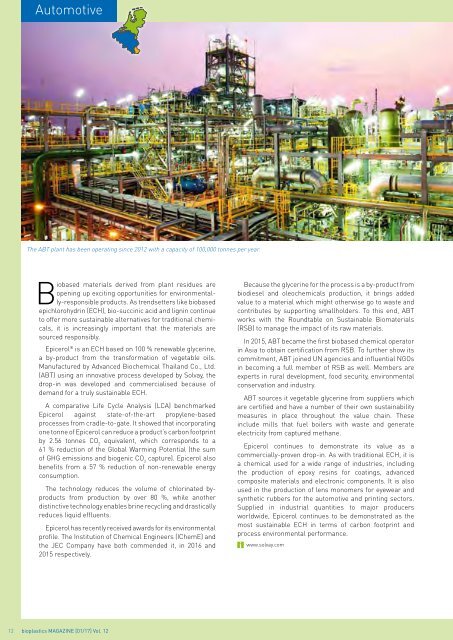Issue 01/2017
bioplasticsMAGAZINE_1701
bioplasticsMAGAZINE_1701
Create successful ePaper yourself
Turn your PDF publications into a flip-book with our unique Google optimized e-Paper software.
Automotive Materials<br />
The ABT plant has been operating since 2<strong>01</strong>2 with a capacity of 100,000 tonnes per year.<br />
Biobased materials derived from plant residues are<br />
opening up exciting opportunities for environmentally-responsible<br />
products. As trendsetters like biobased<br />
epichlorohydrin (ECH), bio-succinic acid and lignin continue<br />
to offer more sustainable alternatives for traditional chemicals,<br />
it is increasingly important that the materials are<br />
sourced responsibly.<br />
Epicerol ® is an ECH based on 100 % renewable glycerine,<br />
a by-product from the transformation of vegetable oils.<br />
Manufactured by Advanced Biochemical Thailand Co., Ltd.<br />
(ABT) using an innovative process developed by Solvay, the<br />
drop-in was developed and commercialised because of<br />
demand for a truly sustainable ECH.<br />
A comparative Life Cycle Analysis (LCA) benchmarked<br />
Epicerol against state-of-the-art propylene-based<br />
processes from cradle-to-gate. It showed that incorporating<br />
one tonne of Epicerol can reduce a product’s carbon footprint<br />
by 2.56 tonnes CO 2<br />
equivalent, which corresponds to a<br />
61 % reduction of the Global Warming Potential (the sum<br />
of GHG emissions and biogenic CO 2<br />
capture). Epicerol also<br />
benefits from a 57 % reduction of non-renewable energy<br />
consumption.<br />
The technology reduces the volume of chlorinated byproducts<br />
from production by over 80 %, while another<br />
distinctive technology enables brine recycling and drastically<br />
reduces liquid effluents.<br />
Epicerol has recently received awards for its environmental<br />
profile. The Institution of Chemical Engineers (IChemE) and<br />
the JEC Company have both commended it, in 2<strong>01</strong>6 and<br />
2<strong>01</strong>5 respectively.<br />
Because the glycerine for the process is a by-product from<br />
biodiesel and oleochemicals production, it brings added<br />
value to a material which might otherwise go to waste and<br />
contributes by supporting smallholders. To this end, ABT<br />
works with the Roundtable on Sustainable Biomaterials<br />
(RSB) to manage the impact of its raw materials.<br />
In 2<strong>01</strong>5, ABT became the first biobased chemical operator<br />
in Asia to obtain certification from RSB. To further show its<br />
commitment, ABT joined UN agencies and influential NGOs<br />
in becoming a full member of RSB as well. Members are<br />
experts in rural development, food security, environmental<br />
conservation and industry.<br />
ABT sources it vegetable glycerine from suppliers which<br />
are certified and have a number of their own sustainability<br />
measures in place throughout the value chain. These<br />
include mills that fuel boilers with waste and generate<br />
electricity from captured methane.<br />
Epicerol continues to demonstrate its value as a<br />
commercially-proven drop-in. As with traditional ECH, it is<br />
a chemical used for a wide range of industries, including<br />
the production of epoxy resins for coatings, advanced<br />
composite materials and electronic components. It is also<br />
used in the production of lens monomers for eyewear and<br />
synthetic rubbers for the automotive and printing sectors.<br />
Supplied in industrial quantities to major producers<br />
worldwide, Epicerol continues to be demonstrated as the<br />
most sustainable ECH in terms of carbon footprint and<br />
process environmental performance.<br />
www.solvay.com<br />
12 bioplastics MAGAZINE [<strong>01</strong>/17] Vol. 12


















